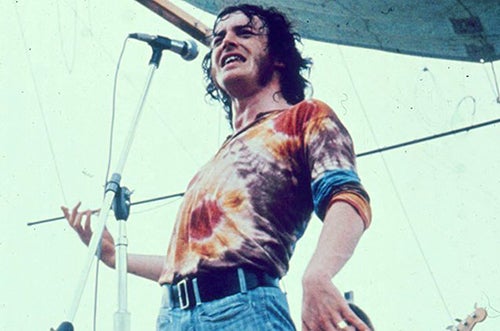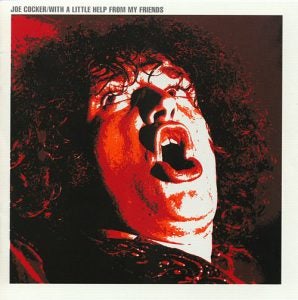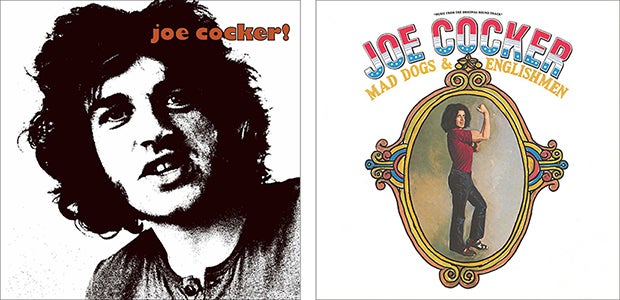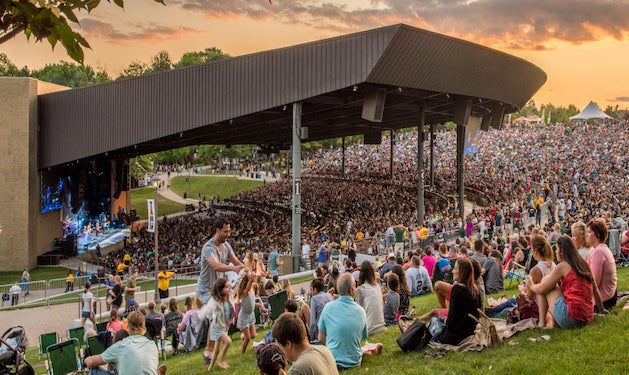On Sunday afternoon, an English band called The Grease Band kicked off the third day of music at Woodstock. After playing two songs, their leader, Joe Cocker, stepped off the helicopter and onto the stage to begin his hour-and-a-half set that was one of the most memorable of the festival.
Day Three, Performer 1: Joe Cocker (The Grease Band)
Performed Sunday afternoon, August 17, 2:00–3:30 pm

Joe Cocker gave an emotional, soulful performance at Woodstock.
Joe Cocker Band Members
- Joe Cocker: vocals
- Chris Stainton: keyboards
- Henry McCullough: guitar
- Alan Spenner: bass
- Bobby Torres: congas
- Bruce Rowland: drums
Joe Cocker Woodstock Setlist
- Who Knows What Tomorrow May Bring? (Grease Band)
- 40,000 Headmen (Grease Band)
- Dear Landlord
- Something's Goin' On
- Do I Still Figure in Your Life
- Feelin' Alright
- Just Like a Woman
- Let's Go Get Stoned
- I Don't Need No Doctor
- I Shall Be Released
- Hitchcock Railway
- Something to Say
- With a Little Help from My Friends
Born in 1944 in Sheffield, England, John Robert “Joe” Cocker grew up in a working-class family. Inspired by the skiffle sounds of Lonnie Donegan and the soulful R&B of Ray Charles, he was singing in clubs by the age of 12. In short order, Cocker was performing in pubs around Sheffield, singing American R&B and blues songs, while working as a gasfitter on the side. In 1964, with his group, Vince Arnold and The Avengers, Cocker recorded a cover of The Beatles’ “I’ll Cry Instead,” but the record flopped, despite the fact that a young Jimmy Page played guitar on the song.
Two years later, Cocker teamed up with Chris Stainton to form The Grease Band, which changed his career trajectory of playing pubs in the greater Sheffield area. Coming to the attention of Denny Cordell, the producer of The Moody Blues and Procol Harum, Cocker recorded a single, “Marjorine,” that somehow became a minor hit in the United States. In 1969, Cocker recorded his own version of another Beatles song, “With a Little Help from My Friends,” (featuring an arrangement by Jimmy Page, who also played guitar on the song) which Paul McCartney said “was just mind-blowing, totally turn[ing] the song into a soul anthem, and I was forever grateful to him for doing that.” The track was a huge success, which reached the top ten in Britain and a respectable #68 in America.
To promote this and the 1969 album that sprung from it (also called With A Little Help From My Friends), Joe Cocker and his newly reformed Grease Band, who now consisted of ace guitarist Henry McCullough, bassist Alan Spenner, and drummer Bruce Rowland, toured extensively, largely in the U.S.. By the summer of 1969, they were darlings of the U.S. festival circuit, and as such it was no surprise that promoter Artie Kornfeld signed them up to perform at the Woodstock festival.

from My Friends (A&M, 1969) was released only four months
before his memorable Woodstock performance
Joe Cocker was the first scheduled act on Sunday, and he was preceded onstage by his backing group, The Grease Band. The Greasers worked their way through instrumental versions of two recent songs by the English group Traffic, “Who Knows What Tomorrow May Bring” and “40,000 Headmen.” Cocker then strode to center-stage opening his set with a cover of Bob Dylan’s “Dear Landlord” dedicated to Max Yasgur, which would soon be issued on Cocker’s second album Joe Cocker! Another celebration of the moment was up next with “Something’s Coming On,” an original tune (co-written with Grease Band keyboard player Chris Stanton) which had been the B-side of his hit cover of The Beatles’ “With A Little Help From My Friends,” released the previous year.
Cocker brought the mood down a bit with a cover of Pete Dello’s “Do I Still Figure In Your Life?” which had recently been released on the first Joe Cocker album. More covers from the same album followed with Traffic’s “Feeling Alright” (soon to be a hit single for Mr. Cocker) and a moving version of Bob Dylan’s “Just Like A Woman.” By this point, the response from the still-sleepy crowd was polite though not necessarily ecstatic. It was time to change that.
Joe Cocker finally broke through to the Woodstock crowd in a big way with his cover of The Coasters’ “Let’s Go Get Stoned” (his version being based on Ray Charles’ 1966 cover). No doubt there were a few audience members who took this as a call to action. Another more high-powered Ray Charles cover followed this, “I Don’t Need No Doctor.” A second Bob Dylan cover, “I Shall Be Released” (a studio version of which was released on With A Little Help From My Friends), again brought the mood back to mellow for a few moments. The set continued with Donald “Duck” Dunn’s “Hitchcock Railway” (to be released on Joe Cocker!) and the mellow original “Something To Say,” (which would finally be released on the 1972 album Joe Cocker, which is not to be confused with the late 1969 Joe Cocker!).
It was time now to close out the set in a most crowd-pleasing way with his hit cover of “With A Little Help From My Friends.” For close on eight minutes, Cocker alternately crooned and screamed his way through this Beatles classic, turning in a far superior performance to the one offered by Richie Havens two days earlier. This performance would become an instant classic and, thanks to its inclusion in Michael Wadleigh’s documentary of the festival, remains among the most enduring of all Woodstock images.
There was no encore because, by the time Cocker had finished his set, some seriously nasty storm clouds were gathering quickly from the west (some say that this was related to Hurricane Camille, which was then ravaging the southern United States; this is incorrect). Within minutes, with a strong wind blowing through, John Morris was onstage attempting to get people to move away from the lighting towers, in case the heavy lamps resting on top of them wound up tumbling into the crowd. Soon enough, the skies burst with a particularly vicious, soaking rain, swamping everything and turning the entirety of Woodstock Nation into an enormous mud pit. No one was injured in the storm, but for a large number of attendees this would prove to be the final straw, and a mass exodus out of Bethel had begun by 4:00 pm.
After Woodstock, Joe Cocker toured incessantly and released several more albums. Growing tired of touring, he disbanded The Grease Band, but in 1970, to fulfill contractual obligations, he assembled a new band for an American tour. Enlisting Leon Russell as his bandleader, Cocker’s tour and new band became known as Mad Dogs & Englishmen. In the years since, Joe Cocker went through several bouts of depression, alcohol abuse, and heroin addiction, but his career was dotted with moments of greatness as a solo artist and collaborator. His 1974 single, “You Are So Beautiful,” reached #11 on the U.S. charts, and a 1982 duet with Jennifer Warnes, “Up Where We Belong,” reached #1 on the Billboard Hot 100.

Joe Cocker! (A&M, 1969) was released, followed
the following August by the double album, Mad Dogs & Englishmen
The other members of The Grease Band all continued in the music industry, their paths often crossing as they individually worked with Spooky Tooth, Paul McCartney, the British cast of Jesus Christ Superstar, Mad Dogs & Englishmen, and Fairport Convention. Chris Stainton worked with Cocker on various projects through the years, and has been a touring member of Eric Clapton’s band for many years. Bassist Alan Spenner died in 1991 from a heart attack, while guitarist Henry McCulloch passed away in 2016 following a stroke. Drummer Bruce Rowland continues to work as a composer of film and TV scores in his native Australia.
In recognition of his contribution to music, Joe Cocker received an Order of the British Empire at Buckingham Palace in 2008, and his two appearances at Bethel Woods Center for the Arts were convincing evidence that he still “had it” in his later career. Joe Cocker died after a lengthy battle with lung cancer on December 22, 2014, leaving behind an extraordinary musical legacy that will no doubt excite and delight generations of fans to come.
—Wade Lawrence & Scott Parker
